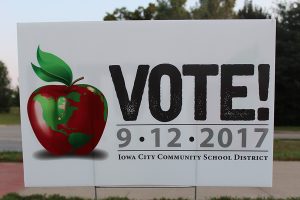Iowans weigh in on proposed school funding bill
Community members voiced their opinions regarding Senate Study Bill 1065 via a public forum Zoom meeting.
January 25, 2021
A virtual meeting open to the public was held for community members to provide input on Iowa Senate Study Bill 1065 Jan. 25. Education Committee Chair Sen. Amy Sinclair (R) and Vice-Chair Sen. Brad Zaun (R) facilitated the discussion from Senate chambers in Des Moines. About 300 community members from around the state attended, and 25 individuals voiced their position on the bill, many of whom represented larger organizations.
SSB 1065 was proposed by Gov. Kim Reynolds before being introduced to the Senate by the Education Committee, headed by Sinclair and Zaun, Jan. 20. Ranking Member Sen. Herman Quirmbach (D) expressed concern that SSB 1065 was being fast-tracked, noting that the bill was introduced to the Senate several times quicker than the usual bill drafting process.
“The awareness of the bill across the state has been growing, but it’s still limited. Today, I think is just the tip of the iceberg,” Quirmbach said. “I think that we should slow this process down to allow awareness to build, allowing the details to be examined more carefully and to take the full measure of this. The predominant response today has been negative, not without some advocates, but predominantly negative to foster that process.”
If passed, SSB 1065 would fund private schools using taxpayer money and establish new Iowa charter schools. Effectively, the bill would also reduce funding for public education throughout the state.
Among the community members who spoke were West students Quincy Tate ’21 and Paras Bassuk ’21.
Tate’s statement focused on how this new bill would affect students with disabilities, citing a 2016 UCLA study that found charter schools disproportionately expel students with disabilities.
“Supporting charter schools without significant oversight, which we currently lack, would be enabling an ableist system,” Tate said. “What we need is a system that helps and supports all children. [By] investing more money into our public schools, we can receive these better outcomes … for students of all ability levels.”
Charter schools receive government funding but operate independently of the established state school system. Under a charter school system, local school boards like the ICCSD could not create policies to address specific issues in their communities.
Bassuk also spoke in opposition, asserting that Iowa schools are suffering from underfunding, and the solution to this lies within increasing funding for public education.
“Properly funded public school districts have the ability to create diverse and productive communities and provide a high-quality education,” Bassuk said. “Over my thirteen years in the Iowa public school system, I have witnessed consistent budgetary cuts to departments and extracurricular activities. The underperformance of public schools is a symptom of legislation like this which strips our schools of the necessary tools to serve students. Facilitating the further drain of resources from public schools is clearly not a decision that benefits Iowa youth.”
However, not everyone who spoke at the community forum was in opposition to the bill. Bill Gustoff from Homeschool Iowa was one of seven speakers who voiced their support for SSB 1065.
“I’m a former skeptic of school choice issues who has become one of the chief advocates for it, so we appreciate that Gov. Reynolds and the Iowa legislature are willing to talk about these current issues and options that are currently unavailable to students,” Gustoff said. “I appreciate that you’re standing with parents to have more options to choose the best option to educate their children.”
Most of those voicing support for the bill emphasized that its implementation would expand education options for students. Sen. Sinclair elaborated on this point, claiming that SSB 1065 would increase opportunities, especially for children of marginalized communities, so long as their parents are held accountable for their education.
“Accountability and transparency should rest on the shoulders of the parents of those children. They are the managers, if you will, of those minority children … so when we talk about transparency and accountability, that ought to be going to the parents,” Sinclair said. “When we’re talking about school choice, we’re talking about giving back to parents that have rights to hold accountable the systems that are in place for their child’s education.
Contrastingly, President of Iowa-Nebraska NAACP Betty Andrews worries that the bill would do the exact opposite, effectively dividing schools based on race and socioeconomic status.
“This bill would potentially finance a cycle that could lead to segregation of Iowa’s schools, reducing funds, allowing wealthier families to flee public schools for less diverse charter or private schools, and reducing funds for poor and minority students,” Andrews said. “That would take us backward and away from the hopes and intentions expressed in the landmark case of Brown v. Board of Education.”
The public can further voice their opinions regarding the passage of SSB 1065 via the Iowa Senate’s website or by calling their respective representatives.








